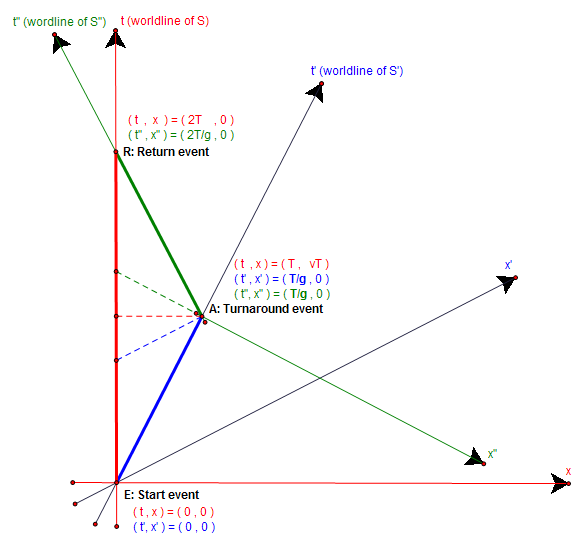
Twins, Events and Transformations
I posted this a while ago on Usenet in group sci.physics.relativity.
See the thread: NheA9.17733$Nd.4888@afrodite.telenet-ops.be
(Corrected a few typo's - thanks for the feedback!)
For background information I refer to:
http://www.math.ucr.edu/home/baez/physics/Relativity/SR/TwinParadox/twin_paradox.html
We use 3 inertial reference frames.
S: The frame of the "stay at
home" twin.
S': The frame of the "outbound
part of the trip".
S": The frame of the
"inbound part of the trip".
In none of these frames any form of acceleration is felt.
In order for the travelling twin to make the trip, she must be in frame S'
while going away and in frame S" when coming back. So at the turnaround
event, she must immediately jump from frame S' to frame S" (without getting
hurt!), and she must take over the time her clock is reading to her new
frame. Her clock will then continue ticking until she returns to her twin
brother who remained in his own frame S during the whole process.
Suppose:
- S uses coordinates
(t,x,y,z)
- S' uses coordinates
(t',x',y',z')
- S" uses coordinates
(t",x",y",z")
\t"(worldline of inbound S")
\
\ |t(worldline of S) /t'(worldline of outbound S')
\ | / (note added on 20-Nov-2011)
\| R: Return event / Event [p] on clock S, simultaneous
[R] (t,x) = (2T,0) / with event [A] according to S'.
|\ (t",x")=(2T/g,0) Event [q] on clock S, simultaneous
| \ / with event [A] according to S".
| \ / At event [A], according to the
| \ / traveller, clock S "jumps" from
| \ / time T-v^2/c^2 to T+v^2/c^2.
t=2T-T/g^2 | \ /A: Turnaround event
=T+v^2/c^2 [q]_ \ / (t,x)=(T,vT)
| ``-._\ / (t',x')=(T/g,0) x'_
| _[A]._ (t",x")=(T/g,0) _.-''
t=T/g^2 | _.-' / `--._ __.-'
=T-v^2/c^2 [p] / ``-.__ _.-'
| / _:-.:_
| / _.-' `--._
| / _.-'' ``-.._ x"
| / __.-' `--_
| / _.-'
|/.=
----[E]------------------------------------------
| E: Start event x
| (t,x) = (0,0)
| (t',x') = (0,0)

Hit this to mail me.
(-: Dirk Van de moortel ;-)